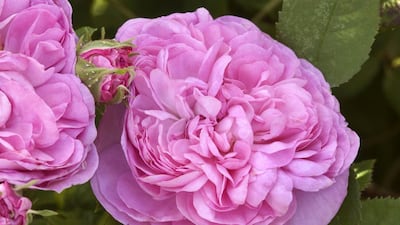‘I come to you ... from the tales of the Damascene rose, that depicts the history of all fragrance," wrote famed Syrian poet Nizar Qabbani.
But he was not the first, or the last, writer to be captivated by the bloom. It was a favourite of Shakespeare, who referenced the flower in Twelfth Night, as well as in Sonnet 130 ("I have seen roses damask'd, red and white"), and of English poet Thomas Rivers, whose ode The Damask Rose captures the famously dense and fragrant nature of the bloom. "High, high, above your head, and on every side down to the ground, the thicket is hemmed in and choked up by the interlacing boughs that droop with the weight of roses, and load the slow air with their damask breath," he wrote.
Beyond being known for its heady fragrance, the Damask rose has long been used for rose oil or “attar of roses”, and is commonly used to flavour food and make rose water. Beyond that, recent research on Rosa damascena essential oil has highlighted its antioxidant, antibacterial and antimicrobial activities. The deciduous shrub can grow to more than two metres tall, with 30-petalled flowers that can range in colour from light pink to light red. It is repeat flowering, making it particularly popular with the perfume industry. “Two of the varieties of the damask rose are repeat flowering,” explains Ian Limmer, nursery manager for Peter Beales, a Norfolk-based rose specialist. “It's also a very tough rose, making it perfect for the perfume industry … it means that they can have an extraction in June, and then chop it down and get another extraction in September.”
A natural hybrid of Rosa gallica with Rosa moschata and Rosa fedtschenkoana, there’s some debate as to whether the flower actually originated in Damascus, but crusader Robert de Brie is believed to have brought the flower to Europe from Syria in the 13th century.
In recent weeks, The National has reported that the conflict in Syria has caused production of the Damask rose in the country to fall to an all-time low. The amount of cultivated land has decreased, fighting has prevented access to many rose fields, and families that might once have picked the crop have fled. So the rose, a symbol of Damascus when it sat at the centre of the Umayyad Caliphate and was known as the Garden of the World, is now a marker of the devastation raging through the country.
Unfortunately, the Damask rose is almost impossible to find in these parts. This could be because of the fact that although it’s a hardy plant and tolerant of most types of soil, it’s best suited to a mild, temperate climate – temperatures of between 0°C and 5°C are required for about 15 days before blooming to enhance the quantity and quality of the blooms. So while the Damask rose can grow in harsher climates, yields are substantially lower. Flowers will also bloom, then wither, much faster in hotter, more-humid conditions.
You do get the multi-petalled Sultani rose, from Pakistan, here. It looks almost identical to the Damask rose, but it’s difficult to quantify whether it’s actually a hybrid or subspecies of the Rosa damascena.
The fact is, whatever species of rose you decide to grow here, it will require extra attention. The experts at Dubai Garden Centre suggest keeping roses in partial shade, particularly in the hotter months, and fertilising at least once a month. Regular pruning is also recommended. “I've consistently nipped off [flowers] as soon as they look as if they are dying and this seems to make them flower even more ... I water it every other day and have given it some fertiliser. I've also mulched on the top with coconut chips,” suggests one member of Dubai's Balcony and Urban Gardeners Group.
Selina Denman is the editor of Home & Garden


